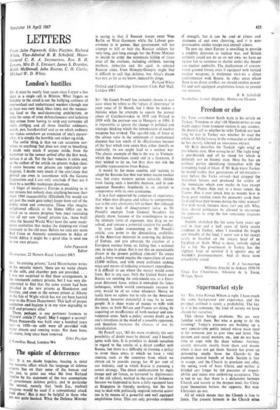Sir: Mr Enoch Powell has- certainly chosen le mot just('
when he refers to the 'opiate of deterrence' in your issue of 31 March, but I. think he makes a mistake when he attempts to equate the prewar crises of Czechoslovakia is 1938 and Poland in 1939 with the postwar one in Hungary in 1956. It is impossible to ignore the change in political and strategic :thinking which the- introduction. of nuclear weapons has evoked: The age-old, rule of force as the ultimo ratik, in. the settlement of international disputes has lost much of its effectiveness, because of the fear- which now exists that, either directly or indirectly, its. use- might lead to a nuclear war. The classic example of this is, the war in Vietnam, which the Americans could end in a forenoon, if they wished ta do so; but thay dare not risk the possible- repercussions from Russia.
It. would be far more sensible and realistic to adopt the Russian-line that war today means nuclear war, but every western nation naturally shrinks from: facing such as horrible, decision, and: in con sequence' flounders hopelessly in an attempt to compromise with its own. conscienue.
It is. a- fact suppornd by centuries. of experience, that wheat mew disagree and refuse to compromise, war is the only alternative left tathern But although there is no leek of disagreement' today as Mr Powell's excerpts from. General Beaufre's list plainly show, because of the unwillingness to use the ultimate form of argument, they drag on un- solved, and remains a potential catalyst for conflict.
In your leader commenting on Mr Powell's article; you points to. the diminishing credibility of the American deterrent. in ensuring the defence of Europe, and you advocate the creation of a European nuclear force, or, failing that, a national one; to take its plain. But is not this an unrealisable dream in. the present political climate? To create such a- force would. require the expenditure of some £3,000 million;, and: with every. politician seeking ways and means of reducing armament expenditure, it is difficult to see where the money would come from. But in any case, both the United States and Russia are entering the antirmissile era, so a Euro- pean deterrent force, unless. itt embodied the latest techniques, whicle would enormously increase its cost, would be ofi no value whatever. Hence we really have no option but to- rely on the American deterrent, however distasteful it may be to some people: It is sheer waste of money to trifle with the issue, as both. Britain and France are doing, by acquiring an insufficiency of both tuirl.PAr and con- ventional arms. Such. a policy creates. doubt as to one's intentions- is the mind, of a. possible opponent, and therefore increases the chances of war by miscalculation.
Mr Powell says, 'All the more stridently the very possibility of doubt must be denied,' and I heartily agree. with. him. IL is pointless to delude outselues ins regard to the- results of a direct conflict with Russia', but there is a difficulty in framing a policy to. cover those areas in which: we have a vital interest, such as the countries from which we obtain, oil to provide energy for 40 per cent of our industry, and in which Russia is pursuing a covert strategy. The direct confrontation by static troops and air forces,, so favoured by diplomatists of the old school, worked in. the case of Indonesia because we happened to have a fully equipped base at. Singapore ia friendly territory, but the best way to deal with politically inspired terrorist activi- ties is by means of a powerful and well equipped amphibious force. This not only provides evidence
of strength, but it can be used at places and moments of our own. choosing, and it is non- provocative, unlike troops and aircraft ashore.
To sum up, since Europe is unwilling to provide a credible deterrent to nuclear war, and Britain certainly could not do so on ner own, we have no option but to continue to shelter under the Ameri- can nuclear umbrella. The deployment of conven- tional ground forces, even if equipped with tactical nuclear weapons,. is irrelevant vis-a-vis a direct confrontation with Russia. In other areas where there is no-direct conflict, we should employ power- ful and well equipped amphibious forces to protect our interests.
B. B. Schofield Neeholme, Lower Shiplake, Henley-on-Thames






























 Previous page
Previous page